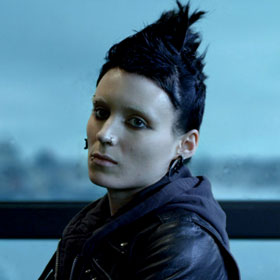The Girl With The Dragon Tattoo

4/5
David Fincher's The Girl with the Dragon Tattoo is about as good as it can be. Based on the popular Stieg Larsson novel, and understandably oblivious to Niels Arden Oplev's 2009 Swedish-speaking version, Fincher's film is a veritable rock concert of sex, money and stylized invocation of brutal violence. As in most of Fincher's oeuvre (Seven, Fight Club and The Social Network, among others), there is a great deal of anger in it, too — anger at injustice, generally, and in this case, at injustice suffered by women.
At the center of this battle is the titular girl, Lisbeth Salander (played by Rooney Mara), who wears her tortured past — as well as her indifference to the norms of straight society — as ink, piercings, leather and a jet black mohawk. Both in print and in film, Salander is a formidable creation. As a foil to Daniel Craig's educated, dutiful Mikael Blomkvist, a befallen investigative journalist called upon to pry into the forty-year-old disappearance of a powerful baron's beloved niece, Salander is the anti-hero you couldn't possibly dislike.
Possessing a Holmesian hyper-rationality, which she applies unflinchingly to all her pursuits, as well as to her adherence to the economy of personal freedom, Salander is a walking weapon dangerous for any flawed human to cross. By now you should know that in one scene Salander is raped, and in another she exacts an exhibition of eye-for-an-eye vengeance at once immensely gratifying and shockingly fair. Without giving away too much we can interpret Salander's revenge as a literal imprinting on her attacker of the permanent emotional scarring levied on rape victims. The act shows insight into how Salander's mind works and to her trustworthiness, which will be called on again and again throughout the film (and, presumably, the next two sequels) as Blomkvist nets himself into troubles progressively trickier.
For Mara in the Salander role we should be grateful to Fincher, who denied the part to better known femmes fatales (Scarlett Johansson, most notably) in favor of someone more mysterious to us. Fincher seldom goes wrong with casting, nor does he tend to flounder in any of the other major categories: sound, art direction, cinematography, dialogue and even opening credits. Infamous for being chained to perfectionism and demanding it of everyone, Fincher usually gets his way.
For this reason each of his films lives on the screen — lives and dies. Each world he creates is one devoid of accidents and full of clues subject to maniacally detailed observation. In 2007's Zodiac, Fincher was the most self-referential he's been in telling the story of a puzzling, still-unsolved serial murder case, and yet he squeezed every cinematic drop out of the material till its carcass lay dry.
Expect something like that from Dragon Tattoo, as well. Why not say, as we can of Facebook and Chuck Palahniuk and aging backwards, that it's been sufficiently Fincherized — kind of like pulverized? Which is to say, a novel once thought to be a worthy challenge for the Fincherator has come up weak in the ring and has been, quite literally, adapted to death.
RELATED ARTICLES
Get the most-revealing celebrity conversations with the uInterview podcast!





Leave a comment